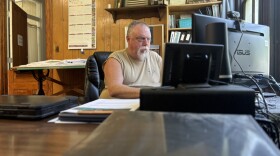-
Urban rivers are struggling with water pollution, as the Blue River in Kansas City shows. Restoring riverside woodlands and other natural areas could lead to a healthier river.
-
KC Water began the Westport Stormwater Improvement Project in January of this year to combat flash floods that have regularly put sidewalks and parking lots in Westport under water. They know the flood mitigation is needed but it makes daily life difficult for people who work, shop and eat in the area.
-
Tumbleweeds have taken over the High Plains. The plant thrives so well in the western part of Kansas that sometimes they can shut down entire neighborhoods or highways. Plus: An inconspicuous insect is changing what survival looks like as climate change remains a threat.
-
A data center in the Crossroads is using the clean energy loan for its chilling equipment. Supporters hope that the loans will encourage the projects to be more environmentally friendly. Critics want the city to do more to regulate the developments.
-
The 250-year-old "Liberty Tree" in Kansas City’s historic Northeast is dying of fungal root disease. Entrepreneur Alex Villalobos-McAnderson has been saying goodbye with a ceremony thanking the tree for its contributions.
-
A volunteer-led Stream Team is using kits to test their local waterways quarterly for phosphorus, ammonia and nitrogen, and survey for small aquatic species, such as clams, snails and insect larvae. Otherwise, funding cuts means that nobody is looking out for Missouri's water health.
-
Who was held accountable for the hazardous powder left near the town of Berger, Missouri? Cleaning up the Superfund site cost more than $4.2 million.
-
Children, homeless people and even city officials entered the building in Berger, Missouri, unaware they were inhaling toxic dust.
-
Sandblasting material used to strip paint was trucked 500 miles or more to a remote warehouse near the Missouri River.
-
Last week, Deep Fission broke ground on a pilot program to bury small modular reactors underground in Parsons, Kansas. This project is the first of its kind in the United States, and comes as part of the Trump Administration’s effort to advance the nation’s nuclear power.
-
Next year, Kansas City’s only drinking water treatment plant will celebrate its 100th birthday. It’s a milestone worth applauding, for sure, but it’s also a reminder that the city has only one place where it makes clean water.
-
Reworld, which manages industrial waste and converts it into energy, honed in on the city’s Armourdale neighborhood for its new processing facility. But the company quietly withdrew its plans after residents demanded answers about potential health and environmental risks.
Play Live Radio
Next Up:
0:00
0:00
Available On Air Stations










